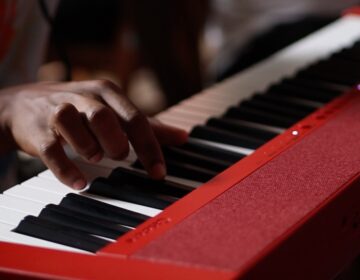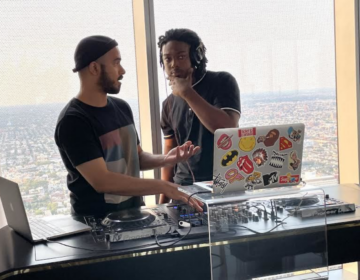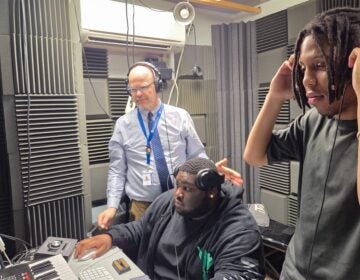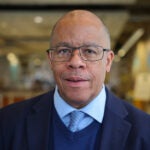From a childhood dream to leading orchestras: The power of music education
Philly’s arts education programs, like Project 440, inspire young musicians to lead and succeed.
Listen 1:20-
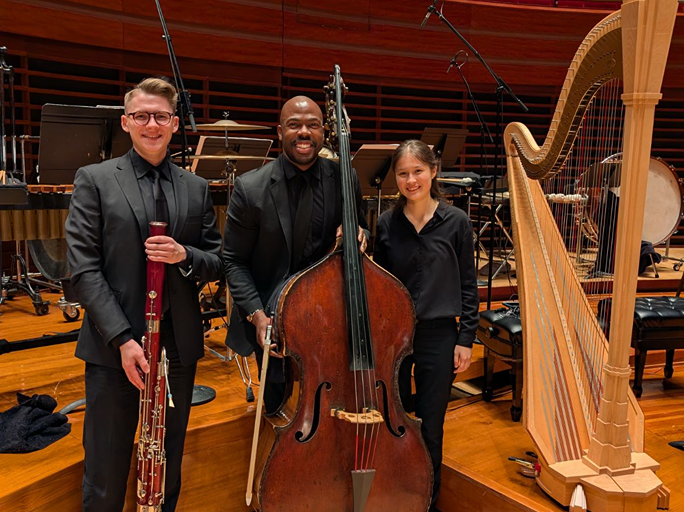
Oleksandr Kashlyuk, a graduate of the Arts Academy at Benjamin Rush High School, who is now a member of a U.S. Air Force Band in Texas; Joseph Conyers, principal bass at the Philadelphia Orchestra; and Maya Lindsey, a Masterman High School graduate who is now a student at Curtis Institute of Music. Kashlyuk and Lindsey both were part of the Project 440 program founded by Conyers. In November 2024, they made their debut as substitute musicians at the Philadelphia Orchestra. (Courtesy of School District of Philadelphia)
-
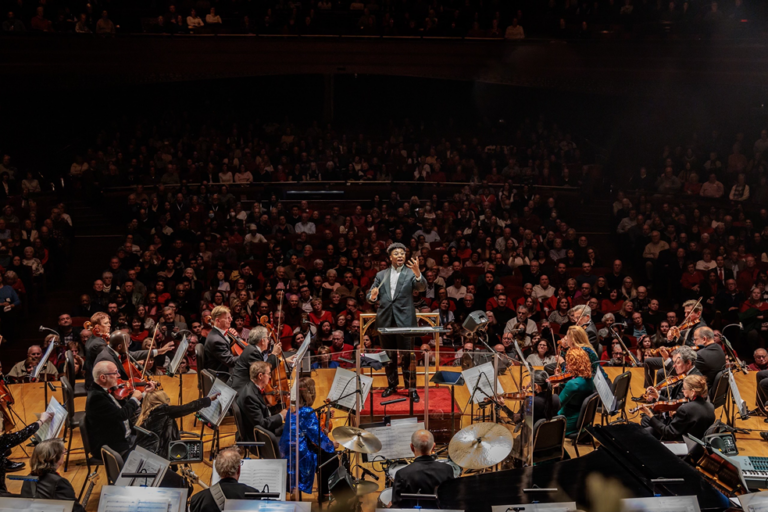
Na'Zir McFadden at the No Name Pops Holiday Extravanganza in Philadelphia in December. (Courtesy Na'Zir McFadden)
-
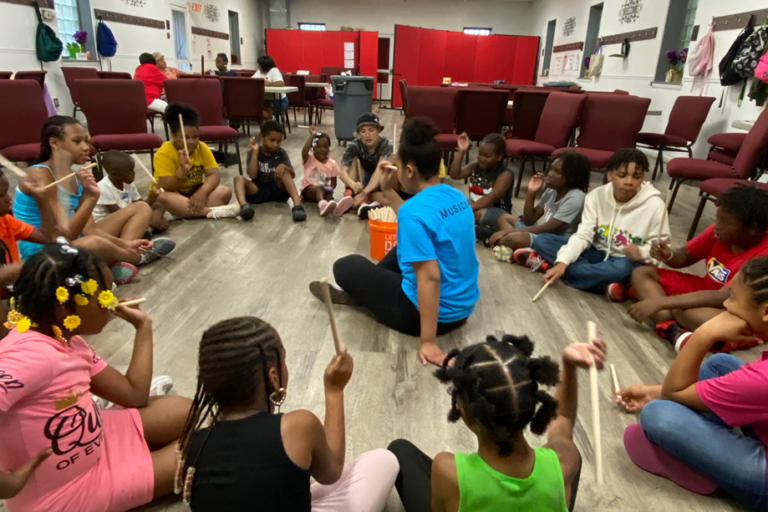
Generation Music, a Philly-based nonprofit co-founded by Chloe Cooper and Claire Casanova, two CAPA graduates, teaches music education to students in underserved communities. (Courtesy of Generation Music.
-
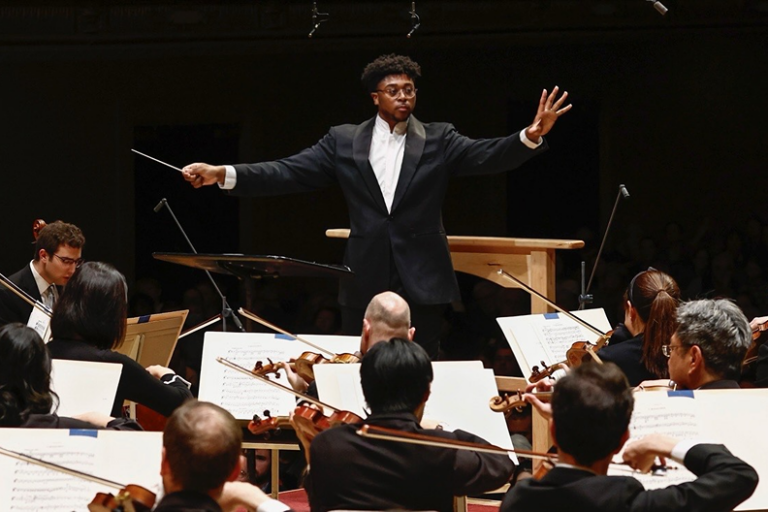
Na'Zir McFadden conducting at the Boston Symphony Orchestra. (Courtesy Na'Zir McFadden)
From Philly and the Pa. suburbs to South Jersey and Delaware, what would you like WHYY News to cover? Let us know!
Growing up in Philadelphia, Na’Zir McFadden would snap plastic coat hangers and wave them through the air. Imagining he was a conductor, he pretended that an entire orchestra was at his command. Clearly, the child had an idea of what his future would hold.
Today at 24, McFadden is assistant conductor of the Detroit Symphony Orchestra, and he credits much to the music education program that changed his life, Project 440.
McFadden called out his mentor, Joseph Conyers, principal bass at the Philadelphia Orchestra, and its director of music education. “If it won’t open, kick it open,” McFadden said.
“I remember him saying, ‘If there is a door in front of you, knock on the door,” McFadden recalled. “Make a way for yourself and become your own advocate. ”
McFadden still lives by Conyer’s advice. When he was in fifth grade, his dream was to someday conduct. The way a simple baton could command and shape the flow of music captured the child, and he wanted to use gestures alone to call sound to his command. He also wanted to master the clarinet. Eventually, he was accepted into the U.S. Navy Band.
As a young man, he faced his own musical crossroads: continue on the path of the clarinet with the U.S. Navy Band, or accept a coveted position as an assistant conductor with the Detroit Symphony Orchestra.
“That was one week before I was supposed to go to bootcamp,” McFadden recalled. “I chose to be a conductor because it’s a dream that I always had.”
“I thought I could help the community and have a greater say in the work that we do as classical musicians, as a conductor,” McFadden said. I want to be a leader, I want to be a musician, I want to be a teacher, I want to be an entrepreneur, and I want to be a creative mind. ”
In his role with the Detroit Symphony, McFadden also serves as the music director of the Detroit Symphony Youth Orchestra, working with about 80 students, ages 12 to 19 each session. The most thrilling part, he said, is watching how quickly the young musicians progress once they realize they can succeed when they put in the work.
“What I find very enjoyable about the job is actually watching the progress — watching them change their mindset from I don’t think I can do this or I’ve never done this before — to if I just do the right things, or if I do something that works me, I can learn the part and we play it together the concert will be amazing,” he said.
McFadden’s career highlights the power of music education — something deeply valued in Philadelphia’s public schools and community programs. In fact, the Philadelphia School District spends millions of dollars each year on arts and music education. However, in the 2015-16 school year, officials took a closer look at whether those funds were being used effectively.
“That led to the development of our arts and creativity framework, which is our blueprint for building art-rich schools,” said Frank Machos, executive director of Arts & Creative Learning at the Philadelphia School District. “We wanted to figure out how to make our schools more creative overall and ensure students had opportunities in every subject area in a culturally inclusive environment.”
A 2023 study by the University of Southern California underscores just how vital these programs are. It found that musical education benefits students’ well-being, helps them develop crucial life skills, and strengthens their connections to school and community.
“It’s why the arts are so important for a child’s holistic education,” Conyers said. “The more you remove the arts, the fewer students dream or aspire. When handed an instrument, you learn to problem-solve, adapt, and collaborate — skills that extend beyond music and into real life.”
Conyers’ Project 440, the nonprofit that helps young musicians hone not just their craft but also their life skills, is insistent on producing more success stories like McFadden’s. The organization offers a flagship course called “Doing Good,” where students design service-learning projects, often linking their musical talents to a community cause. They face a panel — “Shark Tank” style — and for three minutes pitch community leaders, musicians and educators for the chance to win $500 to launch their ideas.
“In this process, they are learning project management, they are learning communications, they are learning collaboration, and they are learning budgeting,” Conyers said. “We’ve developed a curriculum where we use student’s interest in music, their love of music and that passion to ignite the other possibilities in life.
One of the organizations born from this process is Generation Music, co-founded in 2018 by friends Chloe Cooper and Claire Casanova, both graduates of the Philadelphia High School for Creative and Performing Arts. Their nonprofit brings free or low-cost music education to underrepresented neighborhoods.
“We were the first inaugural class in Project 440’s ‘Doing Good’ program,” says Cooper, now Generation Music’s executive director. “They gave us a lot of tools and resources to get our idea off the ground.”
Another standout alum is Oleksandr Kashlyuk, a graduate of the Arts Academy at Benjamin Rush High School, who now serves as an Airman 1st Class in the U.S. Air Force Band of the West. Maya Lindsey, a Masterman graduate, is studying at the prestigious Curtis Institute of Music. In November 2024, the two made their debut as substitute musicians at the Philadelphia Orchestra — an honor many professional musicians dream about.
McFadden also recalls musical collaborations that have turned into friendships and professional connections that persist long after high school.
“We came up through those programs, won auditions together, and sometimes failed auditions together,” McFadden said. “That forges a true sense of community.”
Machos said these success stories demonstrate that robust investment in music and the arts pays dividends for the young artists and their communities alike.
“Students like McFadden, who came through our district’s many music programs, go on to become not only talented musicians but also educators who inspire the next generation,” Machos said.
Ultimately, that aligns perfectly with what Conyers and McFadden hope to see: a new wave of relentless dreamers, unafraid to knock on — and if needed, kick down — a few doors to make their mark on the world.
“If you want something in life, just work for it and be relentless,” McFadden said. “Let nothing stand in your way. That’s the key to success — being relentless about your dream.”
Editor’s Note: This story is part of a series that explores the impact of creativity on student learning and success. WHYY and this series are supported by the Marrazzo Family Foundation, a foundation focused on fostering creativity in Philadelphia youth, which is led by Ellie and Jeff Marrazzo. WHYY News produces independent, fact-based news content for audiences in Greater Philadelphia, Delaware and South Jersey.

Get daily updates from WHYY News!
WHYY is your source for fact-based, in-depth journalism and information. As a nonprofit organization, we rely on financial support from readers like you. Please give today.


